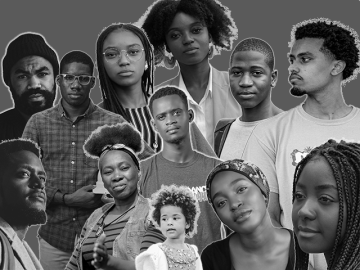FRA’s second ‘Being Black in the EU’ report highlights experiences of people of African descent in the EU.
It shows that, despite binding anti-discrimination law in the EU since 2000 and significant policy developments since then, people of African descent continue to face racism, discrimination and hate crime:
- Racial discrimination – 45% of respondents say they experienced racial discrimination in the 5 years before the survey, an increase compared to 39% in FRA’s last survey. In Germany and Austria, it goes over 70%. Most often, they are discriminated against when looking for work or searching for accommodation. Young people and people with higher education are most affected. Yet, discrimination remains invisible as only 9% report it.
- Harassment – 30% say they experienced racist harassment but almost no one reports it. Young women, people with higher education and those wearing religious clothing are more likely to be racially harassed.
- Racial profiling – 58% say that their most recent police stop in the year before the survey was a result of racial profiling. Those who perceive their stop as racial profiling trust the police much less.
- Work – 34% felt racially discriminated against when looking for a job and 31% at work in the 5 years before the survey. Compared to people generally, they are more likely to have only temporary contracts and are over-qualified for their job.
- Housing and poverty – rising inflation and cost of living have put more people of African descent at higher risk of poverty, compared to the general population. Some 33% face difficulties to make ends meet and 14% cannot afford to keep their house warm, compared with 18% and 7% of people generally. Simply finding a place to live is a struggle for many, with 31% saying they were racially discriminated against when trying to find accommodation.
- Education – young people of African descent are three times more likely to leave school early, compared to young people generally. More parents in 2022 say that their children experienced racism at school than in 2016.
To tackle racism and discrimination effectively, FRA calls on EU countries to:
- properly enforce anti-discrimination legislation as well as effective, proportionate and dissuasive sanctions;
- identify and record hate crimes, and consider bias motivation as an aggravating circumstance when determining penalties;
- collect equality data, including on ‘ethnic or racial origin’ to assess the situation and monitor progress;
- ensure that equality bodies have the necessary mandates and resources to tackle discrimination and support victims;
- take steps to prevent and eradicate discriminatory institutional practices and culture in policing, drawing on FRA’s guide on preventing unlawful profiling;
- develop specific policies to address racism and racial discrimination in education, employment, housing and healthcare.
This report is part of FRA’s third EU-wide survey looking at experiences of immigrants and descendants of immigrants across the EU.
It analyses the responses of over 6,700 people of African descent living in 13 EU countries: Austria, Belgium, Denmark, Finland, France, Germany, Ireland, Italy, Luxembourg, Poland, Portugal, Spain and Sweden.
Quote of FRA Director Michael O’Flaherty:
“It is shocking to see no improvement since our last survey in 2016. Instead, people of African descent face ever more discrimination just because of the colour of their skin. Racism and discrimination should have no place in our societies. The EU and its Member States should use these findings to better target their efforts and ensure people of African descent too can enjoy their rights freely without racism and discrimination.”
For more, please see the findings Q&A or contact: media@fra.europa.eu / Tel.: +43 1 580 30 653
